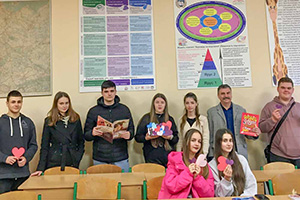To Survive, and to Laugh
February 22, 2024

|
Air-raid sirens interrupt classes and rip through other aspects of daily life in western Ukraine.
For Sergiy Sydoriv, an education professor at Vasyl Stefanyk Precarpathian National University in the city of Ivano-Frankivsk, life outside the heavy bombardment area comes with blaring reminders that life is still far from normal.
“We still pursue inclusive education, but at the same time, many schools in my country are closed or destroyed,” he said. “There is no inclusion where there are no buildings.”
The war has also ravaged the country’s finances, so there are far fewer resources for students with disabilities who remain in the country. Many have left under laws permitting people with disabilities and their families to leave during war, said Sydoriv, who must stay in the country in case he is called to fight.
“Many reforms happened before the invasion as a result of our 2017 inclusive education law, so many parents and students and educators helped to change public opinion and raise awareness of the importance of inclusive education,” said Sydoriv. He is one of 28 professionals from around the world who completed a six-week Americans with Disabilities Act fellowship at the University of Minnesota and Arizona State University in 2017. The Institute on Community Integration’s Renáta Tichá and Brian Abery, co-directors of ICI’s Global Resource Center for Inclusive Education, led the experience and still collaborate with Sydoriv.
He has spoken out forcefully against the bloody Russian invasion that began in 2022, carried on teaching university education courses, and is working on a forthcoming monograph on inclusive education titled, The Space of Inclusive Education: Voices from Ukraine. Tichá provided feedback on the publication. Frequent ICI partner Don Lavin was among chapter contributors.
“If parents want their child with disabilities to be in school, the law says a principal can’t refuse entry, but at the same time he or she can’t guarantee the student’s safety. If they have to go to a shelter with steep stairs down to the cellar, there is no lift or people paid to assist,” he said. “Even in the west, there is more distance learning now because of another problem. There have been calls to schools with bomb threats. It’s another form of terrorism.”
Sydoriv’s work to expand the idea of inclusion in the midst of a warzone sets a global example, Tichá said.
“Since the war in Ukraine started, it has been heart wrenching to know that our colleagues and friends are in danger,” she said. “We stayed in contact with many of them from different projects that are focused on the inclusion of children and youth with disabilities and their families and on building the capacity of teachers for inclusion. For Sergiy and his colleagues to stay engaged, like no other, in educating pre-service teachers during such a traumatic experience goes deeper than mere professionalism to humanism, and they have my full admiration.”
Following his fellowship experience, Sydoriv and colleagues formed a large network of inclusive education professionals around the world. In the immediate aftermath of the war, the network actively checked in with each other.
“We aren’t in as close contact at the moment,” he said. “In the beginning, we would call each other with every bombing. Now, it’s strange, but humans adapt. We try to keep busy and do the things we need to do, and we hope all the fellows are safe. The sirens go off so often now, you can’t call every time.”
Instead, he tries to do the normal tasks and experience the joys of life, including reading books aloud to young people with a group of his university students.
“We need to survive, and also to smile and to laugh,” he said. “We are teaching and living, supporting our armed forces, and hoping for the best.”







